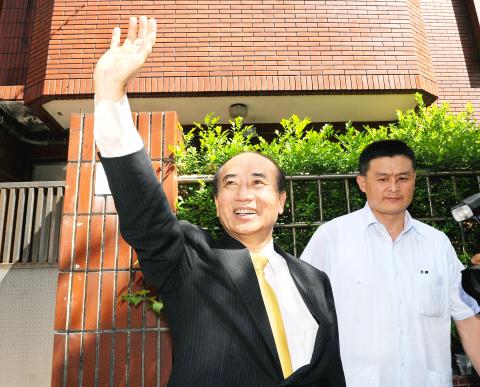The Taipei District Court yesterday ruled in favor of Legislative Speaker Wang Jin-pyng’s (王金平) provisional injunction seeking to retain his Chinese Nationalist Party (KMT) membership and position as head of the legislature.
The court ruled that Wang would be able to retain his membership and rights as a KMT member after submitting a guarantee of about NT$9.38 million (US$314,300), Taipei District Court spokesperson Lai Chien-yi (賴劍毅) told reporters.
The guarantee was calculated based on Wang’s monthly salary and the remainder of his current term of about two-and-a-half years, Lai said.

Photo: Fang Pin-chao, Taipei Times
The ruling was considered a victory for Wang in his battle with President Ma Ying-jeou (馬英九) to keep his political power.
‘ILLEGAL LOBBYING’
The 72-year-old senior politician, who has been accused of being involved in illegal lobbying of the judiciary, had his KMT membership revoked on Wednesday, which the party said should invalidate his status as a KMT legislator-at-large and as legislative speaker.
Wang decided to take the matter to court after the KMT failed to grant him a 20-day appeal period and immediately notified the Central Election Commission (CEC) about Wang’s party membership being revoked.
The court rejected the KMT’s offer of a counter guarantee in its challenge to Wang’s claim, Lai said.
Wang’s injunction was accepted because his loss of position as legislative speaker and a legislator-at-large would be irreversible if the injunction was rejected, Lai said, adding that Wang’s membership would not be affected before another civil lawsuit that Wang had filed said otherwise.
An additional temporary restraining order filed by the Wang camp late on Thursday night, which argued that Wang should retain his position as speaker, was dismissed, the spokesperson said.
Wang’s lawyer, Hsu Ying-chieh (許英傑), told reporters that the ruling was “a complete victory” in terms of the provisional injunction, despite dismissal of the restraining order.
“We are glad the judges have made a critical decision in this historic case,” Hsu said.
The lawyer said the court’s upholding of Wang’s claim was crucial because the KMT’s decision was a revocation of his party membership rather than as a lawmaker or speaker.
“As the revocation of Wang’s party membership was invalidated, the KMT’s moves after the revocation have been nullified as well, which means the CEC’s notification to void Wang’s speaker position was ineffective,” Hsu said.
Chen Ming (陳明), the KMT’s lawyer, told reporters that his client planned to file an appeal within 10 days.
Chen claimed that Wang was disqualified as a KMT legislator-at-large and as legislative speaker immediately after his party membership was revoked.
At around 9:30pm last night, Wang delivered a short statement calling for unity within the party “under the leadership of President Ma Ying-jeou” to work together to meet shared challenges.
Wang reiterated that he will be a KMT member “forever and ever.”

MAKING WAVES: China’s maritime militia could become a nontraditional threat in war, clogging up shipping lanes to prevent US or Japanese intervention, a report said About 1,900 Chinese ships flying flags of convenience and fishing vessels that participated in China’s military exercises around Taiwan last month and in January last year have been listed for monitoring, Coast Guard Administration (CGA) Deputy Director-General Hsieh Ching-chin (謝慶欽) said yesterday. Following amendments to the Commercial Port Act (商港法) and the Law of Ships (船舶法) last month, the CGA can designate possible berthing areas or deny ports of call for vessels suspected of loitering around areas where undersea cables can be accessed, Oceans Affairs Council Minister Kuan Bi-ling (管碧玲) said. The list of suspected ships, originally 300, had risen to about

DAREDEVIL: Honnold said it had always been a dream of his to climb Taipei 101, while a Netflix producer said the skyscraper was ‘a real icon of this country’ US climber Alex Honnold yesterday took on Taiwan’s tallest building, becoming the first person to scale Taipei 101 without a rope, harness or safety net. Hundreds of spectators gathered at the base of the 101-story skyscraper to watch Honnold, 40, embark on his daredevil feat, which was also broadcast live on Netflix. Dressed in a red T-shirt and yellow custom-made climbing shoes, Honnold swiftly moved up the southeast face of the glass and steel building. At one point, he stepped onto a platform midway up to wave down at fans and onlookers who were taking photos. People watching from inside

Japan’s strategic alliance with the US would collapse if Tokyo were to turn away from a conflict in Taiwan, Japanese Prime Minister Sanae Takaichi said yesterday, but distanced herself from previous comments that suggested a possible military response in such an event. Takaichi expressed her latest views on a nationally broadcast TV program late on Monday, where an opposition party leader criticized her for igniting tensions with China with the earlier remarks. Ties between Japan and China have sunk to the worst level in years after Takaichi said in November that a hypothetical Chinese attack on Taiwan could bring about a Japanese

The WHO ignored early COVID-19 warnings from Taiwan, US Deputy Secretary of Health and Human Services Jim O’Neill said on Friday, as part of justification for Washington withdrawing from the global health body. US Secretary of State Marco Rubio on Thursday said that the US was pulling out of the UN agency, as it failed to fulfill its responsibilities during the COVID-19 pandemic. The WHO “ignored early COVID warnings from Taiwan in 2019 by pretending Taiwan did not exist, O’Neill wrote on X on Friday, Taiwan time. “It ignored rigorous science and promoted lockdowns.” The US will “continue international coordination on infectious